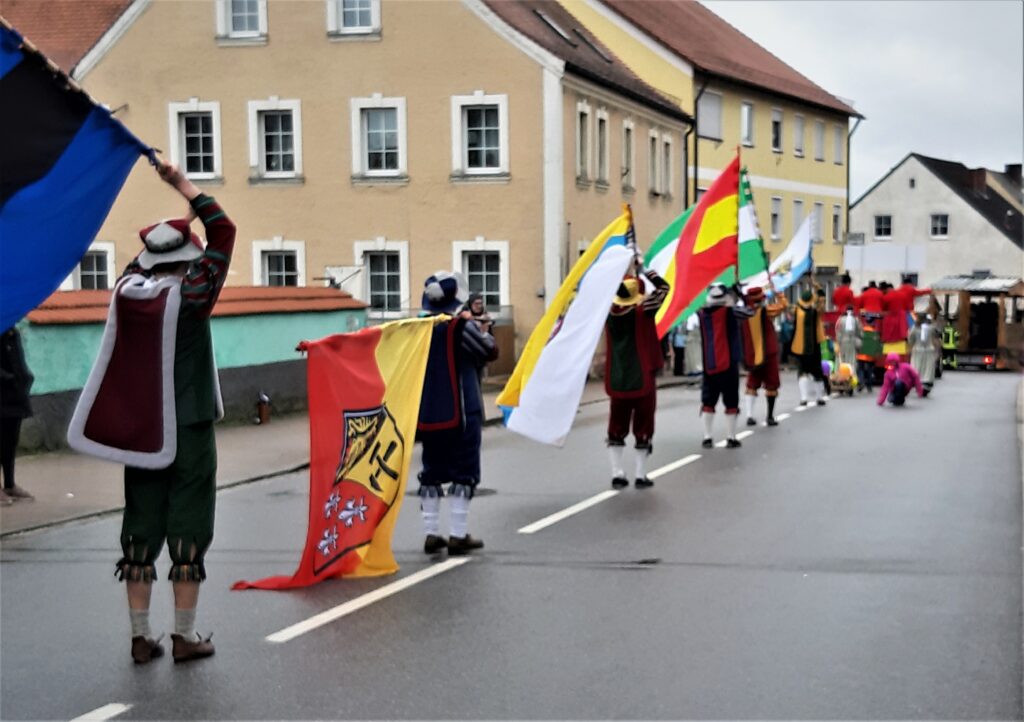 There’s been a lot of excitement in the air this past week. It’s Fasching season. You’ve all heard of Mardis Gras in New Orleans and Carnivale in Venice. Coming from the Latin carne vale, meaning without meat, it is the traditional start to the Lenten season preceding Easter and dates back to the Middle Ages.
There’s been a lot of excitement in the air this past week. It’s Fasching season. You’ve all heard of Mardis Gras in New Orleans and Carnivale in Venice. Coming from the Latin carne vale, meaning without meat, it is the traditional start to the Lenten season preceding Easter and dates back to the Middle Ages.
Well, the Germans have their pre-Lenten parties as well. Originally a Catholic tradition, celebrations have invaded the Protestant regions as well. And in true Deutschland style, every province does it differently.
In the Rhineland and the northwestern part of the country, Karneval is celebrated. This dates back to the 17th century and is a Latin-based holiday similar to the festivities you find in Venice. Karneval kicks off with the Women’s Carnival on the Thursday of the week before Ash Wednesday and extends through Shrove Tuesday with different themes each day. During this time, celebrants enjoy masked costume balls and other events featuring food and drink leading up to the more sober time of Lent. The largest events are the massive parades on Rose Monday, focusing on political and social satire. Cologne is widely considered the largest parade, lasting over five hours, with over 11,000 participants marching for four miles. The floats are known for their works of art, filling the streets with parodies and poking fun at local politicians and current events. There is even Die Buttenrede, a tradition of flowery, humorous, rhyming speeches delivered from barrel-shaped podiums, known as Die Butt, where the local politician may be the “butt” of the jokes.
festivities you find in Venice. Karneval kicks off with the Women’s Carnival on the Thursday of the week before Ash Wednesday and extends through Shrove Tuesday with different themes each day. During this time, celebrants enjoy masked costume balls and other events featuring food and drink leading up to the more sober time of Lent. The largest events are the massive parades on Rose Monday, focusing on political and social satire. Cologne is widely considered the largest parade, lasting over five hours, with over 11,000 participants marching for four miles. The floats are known for their works of art, filling the streets with parodies and poking fun at local politicians and current events. There is even Die Buttenrede, a tradition of flowery, humorous, rhyming speeches delivered from barrel-shaped podiums, known as Die Butt, where the local politician may be the “butt” of the jokes.
 In the south, they celebrate Fastnacht or Fool’s Night. Not quite as wild and crazy as its counterparts, the more subdued costumes represent themes of witches and ghosts of the dark season, in contrast to the happy spirits of spring. It dates farther back to the beginnings of the Christian era and is celebrated by farmers. In rural areas, this was the time when the meat left from the winter was rendered into fat and consumed before fasting during Lent.
In the south, they celebrate Fastnacht or Fool’s Night. Not quite as wild and crazy as its counterparts, the more subdued costumes represent themes of witches and ghosts of the dark season, in contrast to the happy spirits of spring. It dates farther back to the beginnings of the Christian era and is celebrated by farmers. In rural areas, this was the time when the meat left from the winter was rendered into fat and consumed before fasting during Lent.
In the east, from Berlin to Bavaria, they celebrate Fasching, which begins 52 days before Easter and ends on Shrove Tuesday. However, some will argue that it starts at 11:11 on the 11th Day of the 11th month. This is when the planning begins. While it also starts with the Women’s Carnival, the big parades here are held on Sunday instead, with smaller villages having theirs on Rose Monday.
Women’s Carnival, the big parades here are held on Sunday instead, with smaller villages having theirs on Rose Monday.
The Women’s Carnival day appeared in 1824 when local women decided to participate in the celebrations and claimed the Thursday before, thereby ending the male dominance of the entire festivities. The ladies storm city hall and take the key to the city from its mayor. These wild women have been known to kiss a few men in the process and cut off the ends of their ties for souvenirs.
 Fasching dates to the 13th century, and the name is believed to come from an older Germanic word referring to the last serving of alcohol. That’s rather appropriate, as people refrained from alcohol, meat, milk products, and eggs during Lent. Traditionally, young men from the village went house to house, collecting sausages, eggs, and bacon. They wore masks and made lots of noise. That evening they would cook the food, and the villagers ate together. Oh, and there was beer, of course!
Fasching dates to the 13th century, and the name is believed to come from an older Germanic word referring to the last serving of alcohol. That’s rather appropriate, as people refrained from alcohol, meat, milk products, and eggs during Lent. Traditionally, young men from the village went house to house, collecting sausages, eggs, and bacon. They wore masks and made lots of noise. That evening they would cook the food, and the villagers ate together. Oh, and there was beer, of course!
The largest celebration in Bavaria is in Munich, where costumed revelers party in the streets in the Marienplatz in the city center. On Sunday, you can enjoy the Parade of the Daft Knights with colorful floats, dancers, and bands. It winds through the pedestrian zone to the Hofbrauhaus. On Shrove Tuesday, look for the Tanz Der Marktfrauen (the Dance of the Market women). This event has become quite popular but began almost by accident. Sometime in the 1800s, the women who run most of the market stalls in the Viktualienmarkt (food market) decided to take a break and dance on stage, drinking beer. How German can you get?
Smaller villages, such as ours, have festivals and parades, too. These photos are of the town Fasching in 2020, just before covid lockdowns and the event was canceled for two years. This year, after a lovely weekend in Austria celebrating my birthday, I returned with a miserable cold and missed the fun.
Whether you call it Karneval, Fasching, or Fastnacht, they all end at midnight on Shrove Tuesday, except in a few Protestant areas where Fastnacht continues. Ash Wednesday begins Lent, and many people are observant of the season, just like we found when we lived in Greece.
If you’d like to join in on the festivities, make sure you have the traditional foods: bratwurst, pretzels (the large, soft kind), and Krapfen, a doughnut filled with rosehip jam. And, of course, plenty of beer!
Widgit knows there is bratwurst somewhere nearby!
